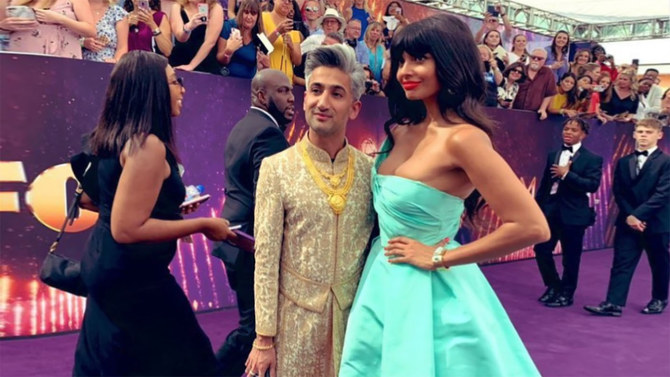ISLAMABAD: In 2019, in the age of Lizzo and emphasis on self-love, it is hard to believe that fairness creams are still very much a thing, and some celebrities, like Tan France and Iqra Aziz, are calling out their existence, joining a roster of famous faces using their unique platforms to champion a movement to love yourself and break away from dangerous beauty ideals.
Tan France who stars on Netflix’s Queer Eye is a Pakistani-British stylist and television personality who recently launched an Instagram account called “Shaded,” with a tagline reading: “A place to celebrate every shade of skin, and to be reminded that every shade is desirable!”
The page which has amassed over 20 thousand followers since he launched, had a post directly calling out the fairness cream industry sandwiched between photos of black, Pakistani, Indian and Mexican performers.
France shared a post with his reasons for starting the page, saying: “I want to encourage people to embrace their natural skin tones and for people to not see us as less than because of our darker shades of skin.”
France also said that brown skinned people should be seen as complete people, desirability included. “We should be afforded that right, too. No more over-looking us because white has been the standard of sexy, up until now. No more low key shading us,” he added.
France is one of the most well known and visible brown faces in mainstream Hollywood, joining stars like Jameela Jamil, Hasan Minhaj, Riz Ahmed, and Mindy Kaling, all actors who have questioned the lack of representation of brown faces and skin as being seen as attractive or even as normal participants of global societies.
In 2017, it was reported that globally skin whitening products were racking in over $4 billion a year, a figure that was estimated to double by 2027. France joins Iqra Aziz in taking issue with the incredibly lucrative fairness cream industry. Earlier this year, Aziz’s fiancé fellow actor, Yasir Hussain, put up a post on his Instagram applauding Aziz for turning down appearing in an advertisement for a whitening cream, writing that the product “spreads complexes in society.”
The key issue is the “complex" being that people from the subcontinent, across Africa and Asia (where skin whitening companies also have booming business) come in many shades that flitter across color spectrums. And in South Asia, brown skin is the norm and white skin is not only an unrealistic beauty standard but in many cases impossible. The desire for fair skin has been long documented, but the prevailing beauty standards have not helped.
Mahira Khan is another Pakistani actor who has rebuffed fairness creams, telling BBC Urdu in 2016 “she will never endorse [whitening] creams as we need to break free from this complex.” Similarly, a whole roster of celebs across the border in India have refused, turned down or dismissed fairness creams, including Ranbir Kapoor and Anushka Sharma.
Jameela Jamil, who stars on NBC’s The Good Place and has been a British television personality for many years, has been leading the charge with her campaign and movement called “I Weigh,” a platform where she encourages people to share things beyond their weight or looks and to highlight their accomplishments, to be okay with themselves as they are. Jamil has also in many public appearances and social media posts called out the lack of representation of brown and black people in mainstream media.
As more celebrities of color are gaining platforms and access to use their influence, this trend of bucking whitening solutions and embracing one’s natural skin color will hopefully continue to rise.
















